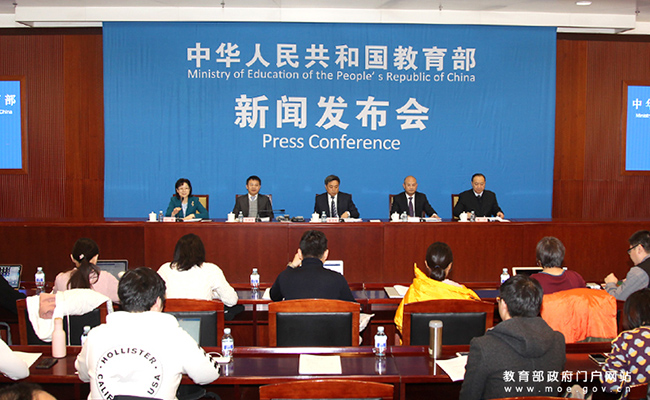
MOE held a press conference to introduce the progress in tackling priority issues in compulsory education. [Photo/Shan Yiwei]
On the morning of December 13, the MOE held a press conference to update the media on the progress that had been made in tackling priority issues in compulsory education. The briefing was hosted by MOE spokesperson XU Mei and attended by LV Yugang, Director of the MOE’s Department of Basic Education (DBE), YU Weiyue, Vice Director of the DBE, FENG Hongrong, Deputy Inspector of the Beijing Municipal Education Committee, and ZHANG Tao, Deputy Inspector for the Department of Education of Henan Province.
Lv gave an overview of recent advances made in addressing three of the most pressing issues faced in primary and secondary schools, namely student workload, school selection and class size. He said that lessening the extracurricular workload was a complex issue involving a wide range of factors. In response to this, the MOE has tightened coordination with other government departments in charge of market supervision, civil affairs, human resources and social security, and emergency management, and introduced four key measures: regulation of out-of-school training programs, oversight of competitions and contests, development of afterschool services, and improvement of quality of education in schools. By December 12, in a national campaign targeting extracurricular programs that put students under too much pressure, a total of 400,000 after-school training institutions had been examined. 273,000 were found to be non-compliant, of which nearly 90% or 248,000 had introduced corrective measures. Approximately 13 provinces introduced measures to facilitate after-school services, while large cities such as Beijing, Tianj, Jinan, Qingdao, Shenyang, Changchun and Wuhan etc. had achieved full coverage of such services in urban primary schools.
With regards to school selection, the MOE introduced a series of measures including: (i) ensuring exam-free enrollment for students within a school’s catchment area, modifying catchment areas around the most sought-after public schools, and introducing random selection as part of the admission process of such schools, (ii) ensuring greater balance in the distribution of educational resources through school grouping – allowing weaker schools to benefit from the momentum of more successful establishments, thereby using leadership by example to raise the quality of schooling more generally; and (iii) encouraging the enrollment of underprivileged students, including children accompanying migrant parents, left-behind children (who remain in rural regions while their parents leave to work in urban areas), and disabled children. To date, 80% of children accompanying migrant parents have been admitted into public schools, and another 7.5% study in private schools with their tuition and expenses covered by government funding. In addition, the compulsory education enrollment rate for blind, deaf and mentally-handicapped students has reached 90 percent. Speaking of the outlook in this field, Lv said that the MOE would further enrollment reforms focusing on raising transparency and fairness, and promoting balanced distribution of quality education resources while stepping up efforts in improving teaching quality in weak schools.
Lv added that to reduce the number of oversized classes, the MOE has worked with the Ministry of Finance and the National Development and Reform Commission on the implementation of the education modernization project prioritizing the establishment and expansion of compulsory education schools in poverty-stricken regions. By the end of October, the proportion of large classes (those accommodating 56 students) was 8.1 percent, while that of supersized classes (those accommodating more than 66 students) was 1.2 percent, down 18.9 and 48.7% from 2017 respectively, both the biggest drops over the past 10 years.
Later during the meeting, Feng and Zhang introduced measures taken and progress achieved in Beijing and Henan Province to address these three difficult issues.



